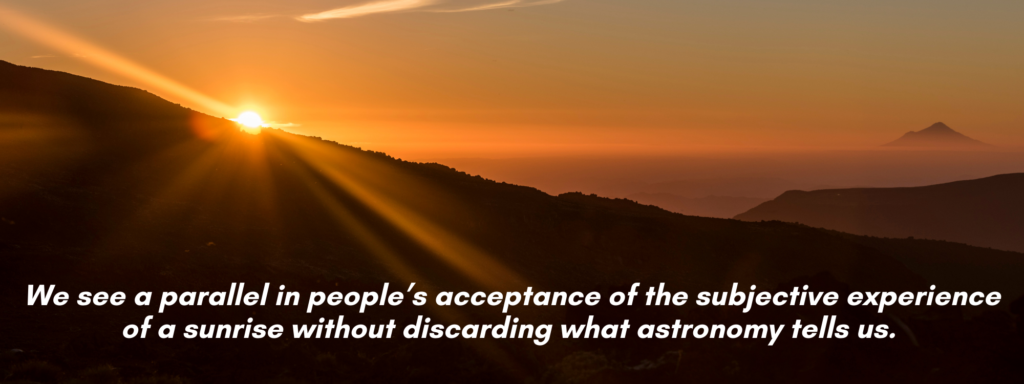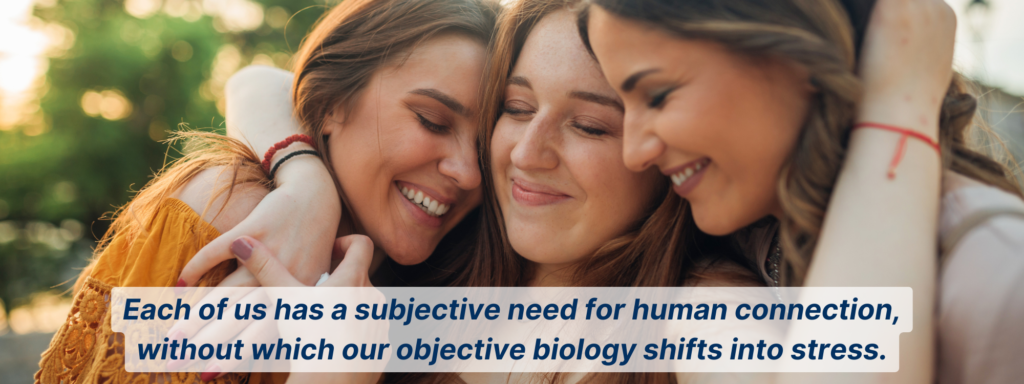Imagine you are holding a glass prism in your hand, tilting it so a single beam of sunlight splits into a vibrant spectrum of colours. It is a simple but revealing phenomenon: one beam, many hues. In the same way, words can refract meaning, exposing subtle depths we might otherwise overlook. One such word is ‘kind’. By exploring its many facets, we can glean insights into identity, belonging, and human connection that are both instructive and deeply humane.
The word ‘kind’ stretches back through centuries of linguistic evolution. Old English had ‘cynd’, which encompassed one’s essential character, nature, and familial bonds. Through Proto-Germanic ‘kundiz’ and Proto-Indo-European ‘gene’, its echoes appear in words like ‘generate’, ‘genus’, and ‘kin’. At its heart, then, ‘kind’ poses two enduring questions: ‘What sort of being am I?’ and ‘To whom do I belong?’
Over the years, I have coached just over a dozen male-to-female transgender individuals. Although their life philosophies differed, their need to tackle these fundamental questions remained constant. Each person longed to live out their authentic self, to be loved and accepted. Some found themselves convinced they were a different kind of woman; from another perspective, they were a different kind of man. Far from a mere riddle or contradiction, their journey reflected an intricate identity, inviting them to reconcile—or at least hold together—two important truths.
Here, ‘kind’ functions not as a dividing line but as a connective thread. It speaks to the complexity of how we define ourselves. Could it be that ‘woman’ and ‘man’ point to sets of biological facts and at the same time to lived experiences? To get our bearings, we might think of the Earth–Sun relationship.

The Sunrise Paradox
Imagine observing the sunrise in a quiet place. The cool air, the warmth breaking over the horizon—every sense affirms that the Sun is ascending. Yet astronomy clarifies that what you perceive is actually Earth’s rotation. This tension between what our eyes report and what science reveals is often described as an ‘illusion’ but knowing it does not lessen the wonder of dawn.
In Japan, a technologically advanced nation, the Sun remains the central emblem on their flag. Their acknowledgement of scientific truths does not contradict their attachment and reverence for the rising Sun. Rather, they comfortably accept both the visceral experience and the astrophysical facts.
Transgender experiences echo a similar duality. Many trans women recognise that biologically, they are male—otherwise, there would be no transition to undertake. Yet they also sense, at a profound level, that they are another kind of woman. It is like two realities overlaid: an objective one and a subjective, lived one. In place of resolving the paradox, one can hold it in view, much as we admire a sunrise even while knowing it is Earth that is moving.
This recognition underscores how ‘mankind’ has come to embrace greater diversity than might be apparent at first glance. We see a parallel in people’s acceptance of the subjective experience of a sunrise without discarding what astronomy tells us.
Kinship & Connection
Humanity forms a sprawling web of relationships. These connections—emotional, cultural, intellectual—are not merely a matter of shared DNA. Our common ground is our membership in this broader ‘family’, which is why ‘kindness’ once meant looking out for one’s kin. Over the ages, that kinship has widened to include people beyond our immediate circle, and we have reaped enormous benefits by extending kindness as far as we can.
For transgender individuals, this practice of kindness is especially resonant. It extends the safety and companionship once reserved for kin to anyone who stands in need of acceptance. Take Angela, a trans woman I met while in hospital for a brief stay. She worked as a nurse and was unfailingly compassionate—not simply in a professional sense but in the kind of everyday empathy we cherish from friends. She grumbled about her boyfriend’s inattentiveness and her boss’s micromanagement, perfectly ordinary complaints. Her life was, in many ways, the same tapestry of small victories and frustrations that we all share.
Moments like these—an apparently ordinary conversation—illustrate how kinship manifests: ‘she’ is ‘we’. Whatever else might separate us, our complaints, our hopes, and our fears bridge that gap, revealing a common thread of humanity.

The Gold & The Stamp
Picture a gold coin. One side might show the head of a monarch; the other, a coat of arms. Yet these images do not define the coin’s worth; the essential value lies in the gold itself.
This is an apt analogy for human identity. We each have an intrinsic nature—our gold—and we have the stamp we present to the world. For Angela, her physiology and her chosen expression might appear in tension, but all she altered was the stamp. The gold remained unscathed. Recognising that difference between substance and surface helps us stay open to the many ways people find fulfilment in who they are.
When we focus solely on the stamp, we risk overlooking intrinsic value. However, respecting both the gold and the stamp offers a deeper appreciation of what it means to be human: in every coin, the interplay of metal and markings makes it at once unique and part of a larger currency.
A Place for Everyone
Life on Earth is staggeringly diverse, from oceans teeming with fish to woodlands full of singing birds. We rarely doubt that every creature has its niche. Our own species is no exception. Each of us strives to find the social and emotional ground where we can stand firmly. For trans individuals, this search is often more intricate and more complex.
A trans woman’s male physiology does not nullify her lived sense of self. Both exist, just as the scientific realities behind sunrise do not override our experience of its beauty. At the same time, her physiology cannot replicate the reproductive experiences of a biological woman—carrying a child, for instance. This does not mean her femininity is invalid; it means it is distinct. Both forms of femininity carry significance and deserve respect for what they are.

Moving Forward Together
Our understanding develops more like the branching of a tree than a single path laid out in straight lines. As we delve into the complexities of identity, the bedrock of biological fact remains. And each of us has a subjective need for human connection, without which our objective biology shifts into stress. Whether we come at it through science, philosophy, or everyday conversations, we arrive at a more nuanced sense of the human condition.
The word ‘kind’ acts as a beacon in these discussions, reminding us that we are all of a particular kind—Homo Sapiens linked by our shared nature. Each of us is kin, worthy of consideration and warmth, and capable of extending the same.
In a world that has room for the bird in the sky and the tree in the ground, there is surely a place for each of us. Seeing a paradox is not seeing a problem. Admitting paradox need not mean admitting defeat. Paradoxes can guide us to new questions and a deeper appreciation for the complexity of life.
In this holiday season, as we reflect on shared humanity, we might take the spirit of ‘kindness’ beyond mere sentiment. Let’s be generous in our everyday interactions. Let’s choose to learn from them. We can hold both the scientific and the subjective together, and to honour the gold that lies behind every stamp.
In the end, each of us belongs to the rich variety known as ‘mankind’. Each of us can choose to be kind, and to do so for one another.



